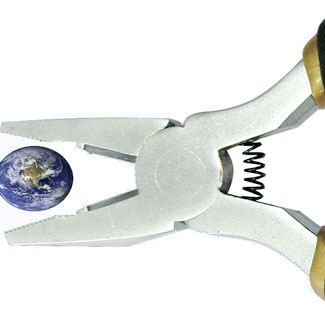I have to admit something: I've been a business consultant.
Not just in the consulting futurist sense, but also in the "let me help you innovate your product cycle, grow your stakeholders, and immanentize your eschaton" sense. Although I don't really do that any more, I'm still somewhat attuned to that language. So when this past weekend I attended the "2008 Venture Showcase" for the Presidio School of Management -- which specializes in sustainability MBAs -- a phrase used in passing by one of the presenters triggered an idea that, upon reflection, might be worth sharing.
What popped into my head during the presentation was the term value ecologies. With the phrase in mind, a rough definition started to spill out: the collection of interdependent producers, suppliers, customers, shippers, competitors, supporters, creators of add-ons, and so forth, all contributing to the perceived value of a product or service, for better and worse.
Unlike "value chains," which focus on how a product or service gets made, or "value networks," which focus on the web of buyers, makers, users, etc., that support a given product or service, a value ecology demands that we consider more than a single "species," makes no assumptions about mutual benefit, and offers no implications of stability.
A given value ecology may include parasites (e.g., companies selling knock-off versions), predators (e.g., big companies looking to buy a smaller product/service provider in order to gain access to the employees), and diseases (e.g., poor performance, usually temporary but potentially fatal), all in a context of a changing environment (e.g., technology, global economics, and so forth).
While this may seem like consultant-ese, this model could actually be useful for foresight practitioners looking to understand the potential for change in a given economic (or technological, or social) niche. You can't just look at how a product or service is made (value chain) or its complement of users and suppliers (value network), you have to think about the whole range of actors and institutions dependent upon and competing with that product or service.
What's happening right now with the US automotive industry is a good illustration of the concept. If auto manufacturing in the US dies off, there are obvious concerns about the workers, suppliers, and buyers. But when you start to play out the larger web of interactions, you start to run into surprises. The death of US automakers could be a deadly blow to network television, for example; watch a few hours of prime time TV (without TiVoing over the ads), and you'll start to see just how dependent commercial television is on car advertisements. Large-scale sporting events are likely hurt, too, for similar reasons. A shift to higher-mileage vehicles (likely faster without the Big Three than with them) would reduce state incomes from gas taxes, and likely accelerate pressure to implement some kind of per-mile-traveled fee in order to pay for infrastructure. The demise of the big US automakers could also open up a niche for unexpected players to enter the market -- the Apple iCar has become something of a cliche, but one could imagine ExxonMobil (flush with cash) setting up a side-operation making cheap gas-only autos. Or Swatch cars making a come-back. Or even IKEA starting to make quick-assembly vehicles (perfect for the DIY crowd).
A more positive version might be seen in something like the iPhone. Its value ecology would include the hackers who "jailbreak" the system to allow new kinds of applications, the competitors scrambling to come up with appealing alternatives (as well as the increased demand for similar devices), the users of other 3G phones on the same network as the iPhone finding the data tubes overloaded with iPhone surfers, web designers having to decide whether to make a site iPhone-friendly, perhaps even the makers of fingerless gloves -- remember that the iPhone touchscreen requires your uncovered fingertip. Any chance of a slight uptick in frostbitten fingers?
I coughed up pretty much all of this in a moment's insight during the Venture Showcase, and later discovered -- much to my surprise -- that nobody used the term "value ecology" for anything even remotely similar to this notion (nearly all of the links found on the All-Seeing Eye of Mountain View simply had the two terms adjacent to each other).
So, for all of you out there doing consulting and management-analsyis type work: is this useful?

 I was pinged recently by the UK outfit
I was pinged recently by the UK outfit 
